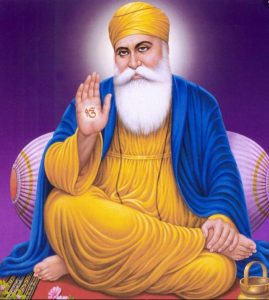Sikhs commemorate founder’s 550th anniversary

This year marks the 550th birthday of Guru Nanak, who is known as the founder of Sikhism. As the founder and first Guru of this religion, he spent his 70 years setting up a unique spiritual, social and political platform based on equality, fraternal love, goodness and virtue. Sikhism is not a branch of Islam and is actually its own religion. In fact, two Sikh gurus, Guru Arjan and Guru Tegh Bahadur, were tortured and executed by the Mughai rulers after they refused to convert to Islam back in the 1600s.
Guru Nanak undertook four major spiritual journeys across India, South Asia, Tibet and Arabia. In these journeys, he preached the new concept of God (Waheguru) as “Supreme, all powerful and truthful, formless (Nirankar), fearless (Nirbhau), without hate (Nirvair), one (Ik), the self-existent (Saibhang), the incomprehensible and everlasting creator of all things (Karta Purakh), and the eternal and absolute truth (Satnam)”. He taught people that the ‘One’ God dwells in every one of his creations.
Setting up a unique spiritual, social and political platform based on equality and love, Guru Nanak attacked the prevailing Hindu Caste System, and condemned the theocracy of Mughal rulers. He described the dangers of egotism, falsehood and hypocrisy, and called upon the people to engage in worship through the “Naam” (the name of God). Guru Nanak promoted the equality of all mankind and upheld the causes of the downtrodden and the poor, laying special emphasis on the equality of women.
Guru Nanak’s teachings can be found in the verses of the Sikh scripture Sri Guru Granth Sahib Ji, which is regarded as the Supreme authority of Sikhism. He emphasized upon the idea that spiritual life and secular household life are not two separate entities, but rather interconnected. In Sikhism, the everyday world is considered a part of the Infinite Reality, in which increased spiritual awareness leads to a livelier participation in the everyday world. Guru Nanak promoted the idea of living an active, creative, and practical life of honesty, fidelity, self-control, and purity. His teachings can be understood through the three pillars of living life:
• Vand Shakna: Sharing what you have with others, not just wealth, but also knowledge so that others’ lives can be improved
• Kirat Karni: Earning and living honestly with high spiritual, moral, and social values; accepting both pains and pleasures as God’s gifts and blessings
• Naam Japna: Meditating upon God’s name to control the weaknesses of human personality and obtaining the ultimate peace of mind through the immersion in appreciation of God’s virtues
Guru Nanak, along with the other Sikh Gurus, taught that the primary goal of the human being is to end all dualities of self and other, mine and yours, and obtain the balance of attachment-detachment, action-inaction, and separation-fusion in daily life.
Guru Nanak first emphasized the idea that all human beings can have direct access to God, and experience God without any rituals or priests. Sikhism is not about pleasing God through ritualistic practices or superficial behavior, but about changing the state of the human mind, and directly connecting with God and achieve spiritual perfection. Sikh ethics emphasize the congruence between spiritual development and everyday moral conduct. Guru Nanak summarized this perspective with “Truth is the highest virtue, but higher still is truthful living.”



























